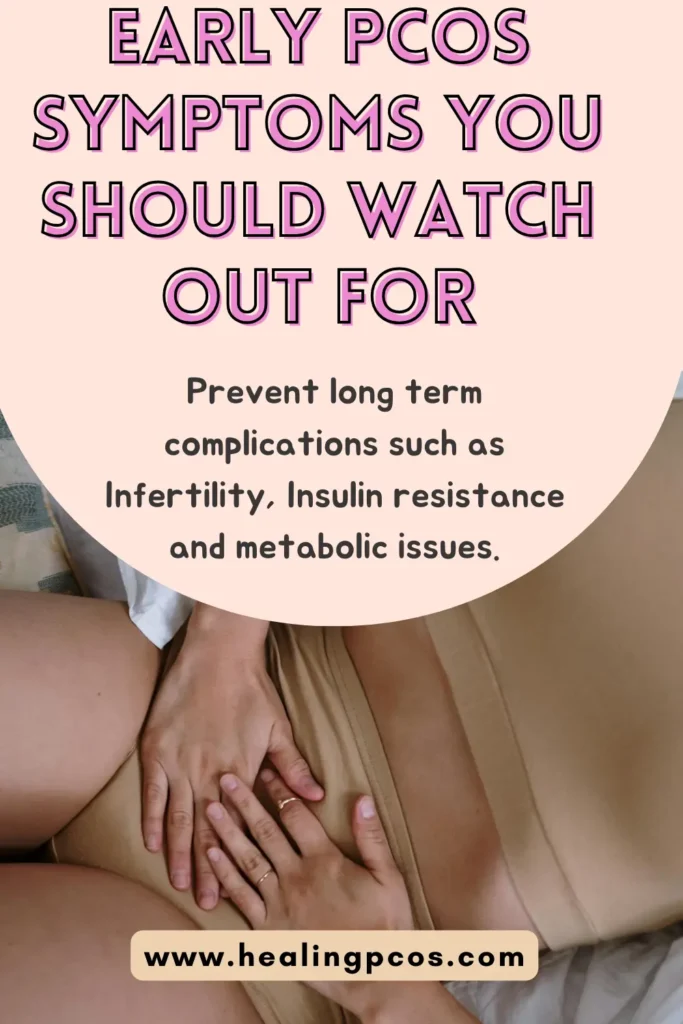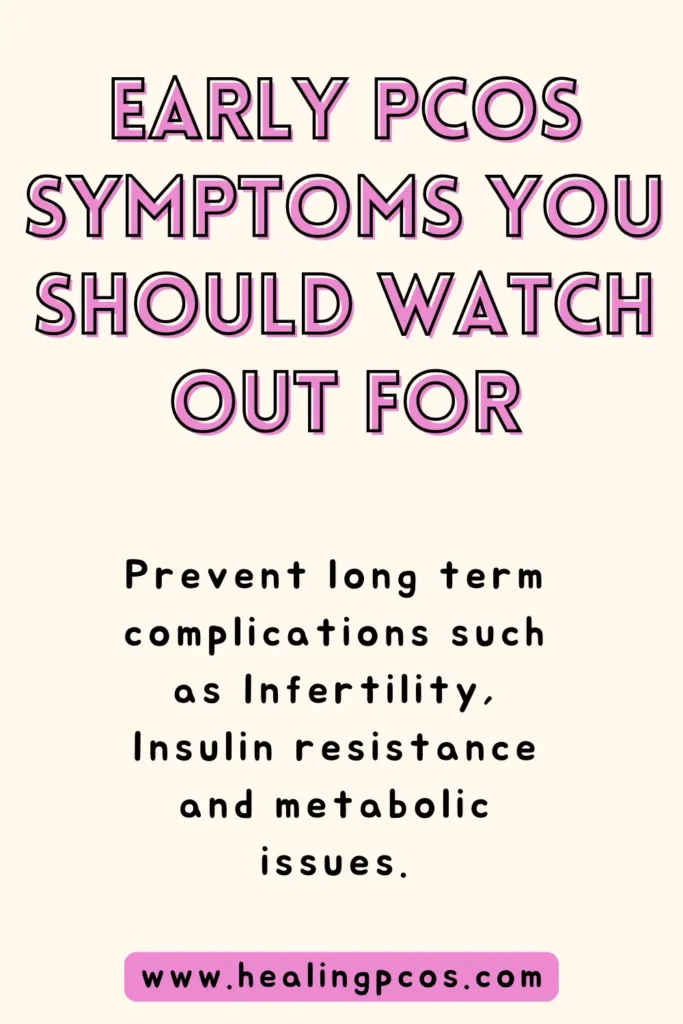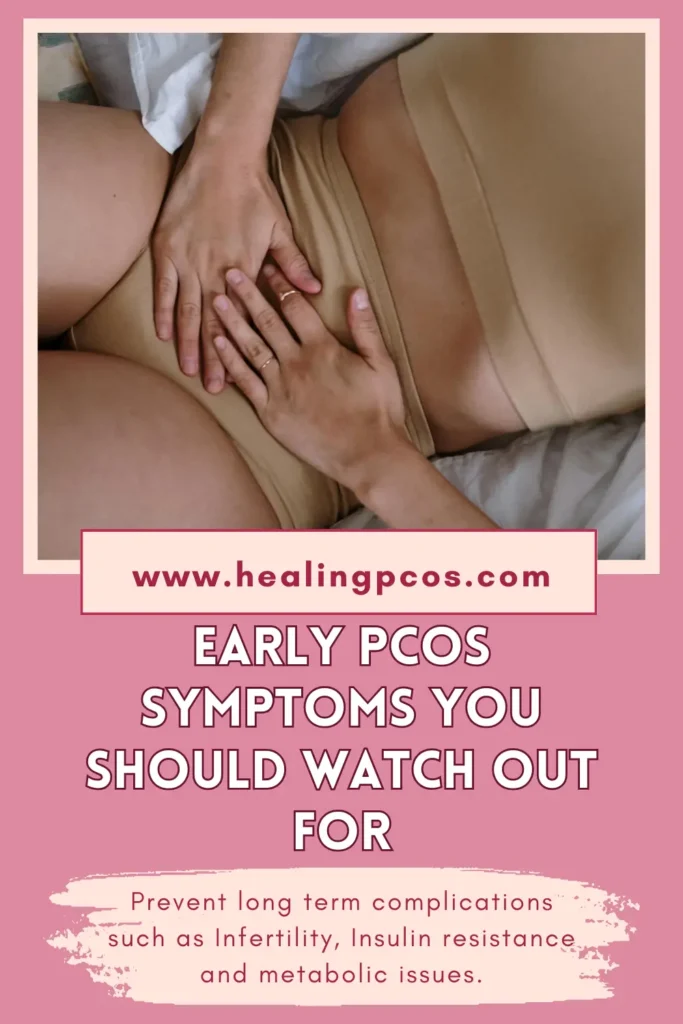Early PCOS Symptoms you should watch out for
In this post we are going over some early pcos symptoms you should watch out for. If you’ve ever wondered why your body feels “off” in ways you can’t quite explain, you’re not alone.
I spent years struggling with frustrating symptoms before finally getting my PCOS (polycystic ovary syndrome) diagnosis. In hindsight, the signs were there all along, I just didn’t know what they meant.
PCOS is a hormonal disorder that affects up to 10% of women of reproductive age, yet many women remain undiagnosed for years. The symptoms can be subtle at first, often dismissed as normal hormonal fluctuations.

But recognizing the early signs of PCOS is key to managing it effectively and preventing long-term complications like insulin resistance, infertility, and metabolic issues.
If you’ve been dealing with persistent sugar cravings, bloating, poor sleep, or unexplained fatigue, these could be early warning signs of PCOS. Let’s break down the symptoms and how they may be linked to this condition.
1. Irregular Periods or No Period at All
One of the most common early signs of PCOS is an irregular menstrual cycle. If your periods are unpredictable, coming every few months or skipping altogether, it could be a sign that your ovaries aren’t ovulating regularly.
According to the publication Endocrine Reviews, women with PCOS often experience anovulation, meaning their ovaries fail to release an egg each month, leading to irregular cycles . This is caused by imbalances in reproductive hormones, particularly high levels of androgens (male hormones).

2. Persistent Sugar and Carb Cravings
I used to crave sugar and carbs all the time—bread, pasta, sweets—you name it. I thought I just had a sweet tooth, but little did I know, my body was actually struggling with insulin resistance, a condition that is strongly linked to PCOS.
Insulin resistance occurs when your cells don’t respond properly to insulin, causing your body to produce more of it to regulate blood sugar. This can lead to intense sugar cravings and energy crashes.
According to the publication The Journal of Clinical Endocrinology & Metabolism, up to 70% of women with PCOS have some degree of insulin resistance . Managing blood sugar levels with a balanced diet, protein-rich meals, and supplements like inositol can help reduce these cravings.

3. Bloating and Digestive Issues
Feeling like your stomach is constantly puffy or uncomfortable? I used to think bloating was just a part of life, but I later realized that inflammation and gut imbalances are common in women with PCOS.
Studies suggest that many women with PCOS have an altered gut microbiome, which can contribute to bloating, constipation, or IBS-like symptoms. Cutting out inflammatory foods like dairy and gluten helped me significantly.

4. Poor Sleep and Insomnia
Despite feeling exhausted all the time, I struggled to get a full night’s rest. PCOS can disrupt sleep due to imbalanced hormones, high cortisol (stress hormone), and blood sugar fluctuations.
According to the publication Sleep Medicine Reviews, women with PCOS are more likely to suffer from sleep disturbances, including sleep apnea and insomnia (source).
I found that magnesium supplements and spearmint tea helped me relax and improve my sleep quality.

5. Fatigue That Won’t Go Away
If you’re constantly feeling tired, even after a full night’s sleep, it could be another early sign of PCOS. Fatigue in PCOS is often linked to insulin resistance, poor sleep, and hormonal imbalances.
The key to combating PCOS-related fatigue is balancing blood sugar, reducing stress, and getting enough protein and healthy fats in your diet. I also started taking an omega-3 supplement, which has been shown to reduce inflammation and improve energy levels.
6. Increased Snacking and Hunger
Before I knew I had PCOS, I found myself constantly snacking—even when I wasn’t truly hungry. This is another effect of insulin resistance; your body struggles to regulate blood sugar, leading to frequent hunger signals.
Balancing meals with protein, fiber, and healthy fats (like avocado and nuts) can help curb excessive snacking. Additionally, inositol supplements have been shown to improve insulin sensitivity and regulate appetite.

7. Unwanted Hair Growth (Hirsutism)
One of the most distressing symptoms I faced was unwanted hair growth on my chin and upper lip. This is caused by high androgen levels, which are common in PCOS.
Spearmint tea has been studied for its anti-androgen effects, and after drinking it daily for two months, I noticed a significant reduction in hair growth.

8. Hair Thinning or Hair Loss
While some women experience excess hair growth, others may notice their hair thinning, especially around the crown of the head. This is another effect of high androgens.
Using rosemary oil and caffeine-infused shampoos helped strengthen my hair, but addressing the root cause—balancing hormones—is the most effective long-term solution.

9. Acne and Oily Skin
If you’re struggling with stubborn acne, especially along your jawline, it could be a sign of PCOS. High androgens increase oil production, leading to clogged pores and breakouts.
A zinc supplement and cutting out dairy made a huge difference for my skin, as dairy is known to trigger hormonal acne.

Final Thoughts: Recognizing the Early Signs of PCOS
If you’re experiencing several of these symptoms, it’s worth speaking to a doctor and requesting blood tests to check your hormone levels. The earlier you recognize PCOS, the sooner you can take steps to manage it naturally through diet, lifestyle changes, and targeted supplements.
For me, identifying the early signs and making small but powerful changes—like cutting back on sugar, managing stress, and taking inositol—made all the difference in how I feel today.










